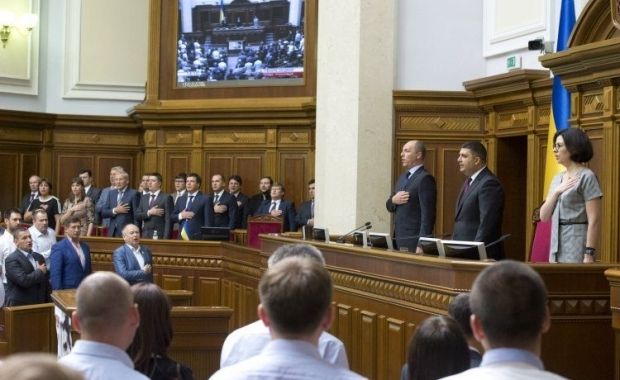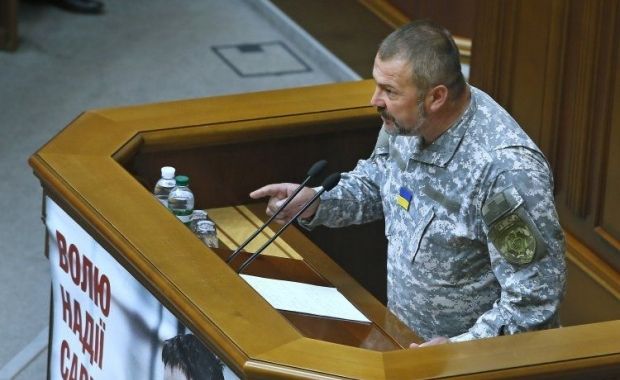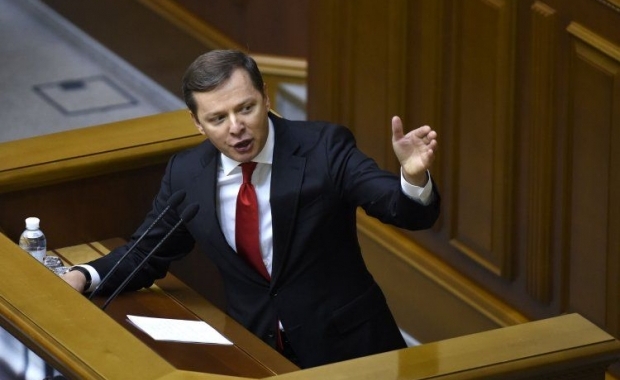
Growing tilt of Coalition "Titanic"
A September 1 announcement of the Radical Party on quitting Parliament Coalition could have an explosive effect if not for the real explosion near Rada a day before.
On the first day of autumn, the main actors near the House of Parliament were bomb disposal experts. At the first glance it seemed that this had to do something with a scheduled vigil over guardsmen killed in a deadly grenade blast but the Kyiv police reported that a bomb threat had been recorded on emergency hotline earlier that morning.
However, the third session of the Verkhovna Rada has opened anyway. Although phenomenally short – under 20 minutes – its atmosphere was anything but cheerful given the tragic events of the day before.
Law enforcement agencies and courts are yet to prosecute those responsible for the attack. At the moment, without defending any of the political forces, considering who could potentially “profit” from the events outside the Rada building, we can mark several milestones.
First of all, the explosion in the heart of Kyiv was aimed at burying several political forces which took their supporters to the streets to protest against Constitutional amendments regarding decentralization (of course, the leaders of these parties largely contributed to this). On the other hand, it was supposed to show the whole world that Ukraine is a mess even amid ceasefire in Donbas. Moreover, it aimed at cultivating an idea that the fighters returning from the ATO zone are mentally unstable.
Despite short-sightedness of Ukrainian politicians, even the most radical ones, it is still hard to believe that they would organize street protests to set themselves up.
But it still looks ugly as no one has taken political responsibility for what happened. Besides, no political force among those who had organized protests provided assistance in investigation, according to Mykola Balan, acting chief of Ukraine’s National Guard.
Secondly, the tragedy and the following political squabbles overshadowed healthy discussion on decentralization amendments, so the issue uncomfortable to the pro-presidential faction was sidelined for some time. Still, as early as next day the Samopomich faction, which expelled five of its MPs, supporters of the amendments, proposed gathering 150 votes to consider a first reading re-vote.
PR on blood
Returning to the September 2 Parliament meeting, it should be noted that it was pretty weird, mostly due to the fact that there were only two speeches: by Speaker Volodymyr Hroisman and Yuriy Bereza from the People’s Front. It’s all good with the speaker as it’s a natural thing to address the lawmakers, but another speech is questionable. On the one hand, it’s OK for the ATO participant like Bereza to address the August 31 events, but on the other – there are ATO veterans in other factions as well.

Besides, remembrance speeches over the victims of August 31 Kyiv riots would less resemble a PR move had the MPs spoke of the Ukrainian fighters who died at the frontline. Of course, there is a valid argument that events in a peaceful Kyiv stand out compared to war chronicles from Donbas. Still, it would be better to see more logic in actions of our lawmakers.
We also want to believe that Hroisman’s call on the law enforcement agencies to identify everyone “responsible for this act of terrorism” will be heard. “We call on the whole law enforcement system to find everyone involved, and all persons complicit in this act of terrorism must bear full responsibility, including political responsibility, for turning an absolutely peaceful protest into deaths and bloodshed,” said Hroisman.
In turn, Yuriy Bereza said: “I call on you, my friends, my comrades, to end with this misunderstanding in our relations. If we don’t learn our lessons, we will go back to 1917 [the year Revolution in Russia started in 20th century]. If we fail to unite now, we will lose this country. And there will be no justification in the whole world. God will never forgive us, people will never forgive us.”
The first in line to “end with misunderstanding” were the Radical Party members led by Oleh Lyashko who announced quitting Coalition. According to Lyashko, his faction "sees it impossible to remain in the coalition, which was actually destroyed yesterday by the hands of President Poroshenko and Chairman of Parliament Hroisman who submitted the issue of Constitutional amendments to Parliament’s consideration contrary to the position of the majority of the coalition factions.”
Lyashko stressed that this resulted in “deaths on the Maidan near the Verkhovna Rada,” claiming that these “bloody provocations” were organized by those who were “in power.” To prove his point, chief “radical” recalled the events in Dnipropetrivsk region back in 1991 when someone threw a grenade at Natalia Vitrenko, one of presidential candidates, which resulted in several people being hurt. “At the time, another candidate – [Oleksandr] Moroz, [Leonid] Kuchma’s main opponent, was blamed for the incident. Moroz was discredited, and Kuch,a won the election,” said Lyashko
Coalition sinking?
Some linked the demarche of the Radical Party with the soon-to-come death of the Coalition. However, given formal signs of parliamentary majority (226 MPs according to the Constitution), it is too early to say. According to the Basic Law, it is the Constitution and the parliamentary regulations that set grounds for dissolving the Coalition.
The current regulations have nothing in it about the Coalition. Some refer to the Coalition Agreement as a document that is to deal with such issues. But, despite the fact that it holds provisions for dissolving the Coalition when the number of its members goes below 226 or when Parliament’s powers are terminated, it is still just a piece of paper compared to the Constitution.
Moreover, no one can tell, exactly how many deputies are in the Coalition today. Many of the lawmakers have either quit their factions or have been expelled. But no one knows if they ever left the Coalition.

Anyway, 21 MPs from the Radical Party quitting Coalition still leave the number of Coalition members above 226. Batkivschina [Fatherland] faction says it has no plans of dumping Coalition. Samopomich faction is also abstaining from controversial statements. Although, we all remember Oleh Lyashko recently promising not to leave Coalition.
So, formally, the Coalition is alive. Legal experts will find a million ways to prove it. But in fact it reminds of a looks like a tilted ship. It can neither sail normally, nor it is rolling over yet.
At the moment, the remaining Coalition members reassure that they will still be comfortable without the Radicals whom they call populists who seek PR ahead of the local elections. But the lack of 226 MPs in the Coalition may give the President grounds to dissolve the Parliament. Moreover, political experts and the lawmakers, themselves, are already discussing the possibility of another snap parliamentary election in spring of 2016.
However, political leaders will test their parties’ readiness for Rada elections during the local election campaign. It will be clear whether the possibility of snap elections can be used by President Poroshenko as a lever against political forces that oppose Constitutional amendments regarding decentralization.
Nadia Pryshlyak, Tetiana Stezhar

